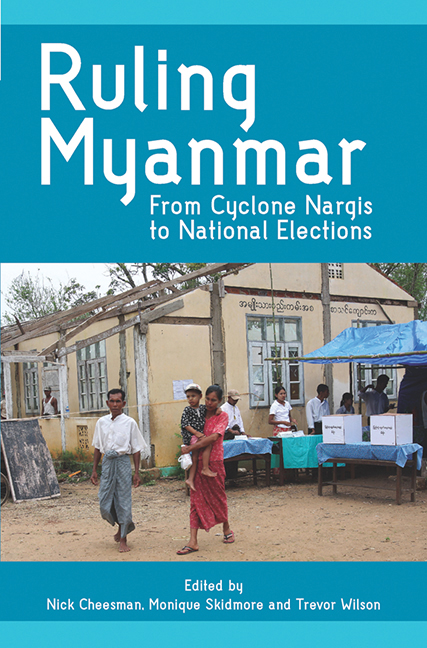Book contents
- Frontmatter
- Contents
- List of Tables
- List of Figures
- Background on ANU 2009 Myanmar/Burma Update Conference
- Acknowledgements
- Contributors and Editors
- Note on Terminology and Geographical Names
- Map of Myanmar
- Part I Overview
- Part II Political Legitimacy, Governance and Justice
- 2 2010 and the Unfinished Task of Nation-building
- 3 Burma's Political Transition: Implications for U.S. Policy
- 4 Sovereignty in the Shan State: A Case Study of the United Wa State Army
- 5 Governance and Legitimacy in Karen State
- 6 The Incongruous Return of Habeas Corpus to Myanmar
- Part III Economic Development, the Rural Economy and Labour Rights
- Part IV The Role of International Cooperation and Governance
- List of Abbreviations
- Index
3 - Burma's Political Transition: Implications for U.S. Policy
from Part II - Political Legitimacy, Governance and Justice
Published online by Cambridge University Press: 21 October 2015
- Frontmatter
- Contents
- List of Tables
- List of Figures
- Background on ANU 2009 Myanmar/Burma Update Conference
- Acknowledgements
- Contributors and Editors
- Note on Terminology and Geographical Names
- Map of Myanmar
- Part I Overview
- Part II Political Legitimacy, Governance and Justice
- 2 2010 and the Unfinished Task of Nation-building
- 3 Burma's Political Transition: Implications for U.S. Policy
- 4 Sovereignty in the Shan State: A Case Study of the United Wa State Army
- 5 Governance and Legitimacy in Karen State
- 6 The Incongruous Return of Habeas Corpus to Myanmar
- Part III Economic Development, the Rural Economy and Labour Rights
- Part IV The Role of International Cooperation and Governance
- List of Abbreviations
- Index
Summary
INTRODUCTION
Burma will be undergoing a political transition over the coming decade. The new constitution promulgated to guide this transition provides for a highly “disciplined”, military-dominated, quasi-parliamentary system with wide-ranging constraints on the participants in election politics and elected bodies. Some believe that this transition, despite the authoritarian constitution, may ultimately prove to be the long-awaited opportunity to develop alternatives to military rule in Burma. Others see the constitution and the coming elections simply as a codification of permanent authoritarian rule in the guise of democracy. Even a careful reading of the constitution does not answer this dilemma; the answer will only become apparent in its implementation, both near-term and long-term. In the near term, outside actors are likely to have very little impact on the 2010 elections and the formation of the newly elected government. Over the longer term, however, Burma's political transition could lead the country to greater international interaction, both politically and economically, depending upon the nature of the new leadership that emerges and the policies that Asian neighbours, Western governments, and international institutions adopt toward the new government. This paper will examine the possible outcomes of Burma's political transition and speculate on how different outcomes might affect U.S. policy.
LEGISLATING “DISCIPLINED DEMOCRACY”
The 2008 Burmese constitution has been carefully crafted by Burma's military rulers to guide the country into a new era of multi-party quasiparliamentary government in which the military itself plays a central role in assuring political “discipline.” Although the 2008 constitution has been dismissed by most observers as a thoroughly undemocratic document, the State Peace and Development Council (SPDC) has been clearly unwilling to entertain any suggestion of modification and appears determined to follow through with its plans for elections and transition to quasi-parliamentary government in 2010. We must therefore view the constitution as the blueprint for the transition process and the new government it will produce.
- Type
- Chapter
- Information
- Ruling MyanmarFrom Cyclone Nargis to National Elections, pp. 32 - 51Publisher: ISEAS–Yusof Ishak InstitutePrint publication year: 2010



